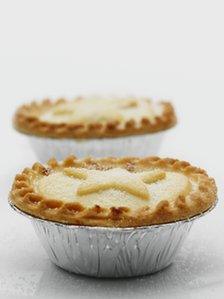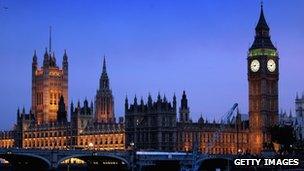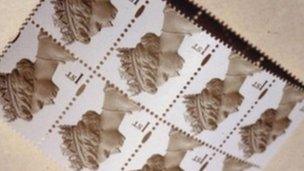Illegal mince pies and other UK legal legends
- Published

Could eating a mince pie at Christmas be bad for more than your waistline?
The Law Commission has proposed the abolition of 800 antiquated laws, but there is a wealth of mythology about what is and isn't illegal.
Can you really be arrested for eating a mince pie on Christmas Day? Are you within your rights to shoot a Welsh person with a longbow on a Sunday in Chester? According to British urban legend, ancient laws could still land you in trouble or, literally, allow you to get away with murder.
As the story goes, everything from sticking a stamp on a letter the wrong way around to driving without a bale of hay in your boot theoretically runs the risk of arrest from an over-zealous police officer.
But most of these legendary laws are just that - legend and not reality.
Some of the laws did exist but have since been overturned. Others, like the ban on boys under the age of 10 seeing a naked mannequin, never quite made it on to the statute books.
So how did people come to believe that enjoying a mince pie could land them in jail and sticking a stamp upside down was tantamount to treason?
Dying in Parliament
Legend: It is illegal to die in Parliament. This was voted Britain's "most ludicrous law, external".

The punishment for dying in Westminster was never made clear
Evidence:The idea seems to be tied up with another parliamentary myth - that anyone who dies in Westminster is entitled to a costly state funeral.
Because state funerals are usually reserved for kings and queens, so the story goes, non-monarchs must not be allowed to die in Parliament and should instead be rushed off the Westminster estate in an ambulance.
But a spokesman for the House of Commons says: "We're not aware of any such law. It's tied up with the convention that, if somebody does die, they're under the jurisdiction of the coroner of the Royal Household."
Three men who definitely would have fallen foul of the mythical law were Guy Fawkes, Sir Walter Raleigh and Spencer Perceval. All were killed in the grounds of Westminster. None received a state funeral.
Verdict: Myth.
Upside down stamps
Legend: It is a treasonable offence to stick a stamp upside down on a letter.
Evidence: A stamp bears the Queen's face but is it really treason to stick one the wrong way around?

Could an upside down stamp bring a treason charge?
The 1848Treason Felony Act, externaloutlaws any offence intended to "deprive or depose" the Queen of the "imperial crown of the United Kingdom" but makes no mention of stamps.
Stick a stamp upside down and your gas bill payment or family postcard might be late but it will not get you in trouble with the law.
A Buckingham Palace spokesman says it's not something the Royal Family would comment on. But Royal Mail did confirm there is no sanction for sticking a stamp upside down. "It's a myth and not true. There's nothing to say you can't put a stamp upside down," a spokeswoman says.
Verdict: Myth.
Mince pie ban
Legend:It has been claimed, externalthat the act of eating a mince pie on Christmas Day is illegal in England.
Evidence: Festive celebrations, including mince pies and Christmas puddings, were reportedly banned in Oliver Cromwell's England as part of efforts to tackle gluttony.
But the ban did not survive when Charles II became king. In fact, the Law Commission says none of the 11 laws that remained on the statute books after Cromwell's reign related to mince pies.
Verdict: Myth.
Are Welsh people safe in Chester?
Legend: Former Coronation Street star Adam Rickittreportedly said in 2006, externalthat if his campaign to become a Tory MP was successful, he would seek to abolish a law allowing people in Chester to kill Welsh visitors.

Adam Rickitt reportedly made repealing anti-Welsh orders a campaign pledge
Rickitt's campaign was unsuccessful but the myth about the law persists.
Evidence: The claim comes from agruesome order, externalissued by Henry, Prince of Wales, in 1403. After Welsh uprisings in the city, the prince demanded that the Welsh be "driven without the walls of the city".
The prince, later King Henry V, said: "no Welshman, or any person of Welsh extraction or sympathies, of whatsoever state or condition, remain within the walls of the said city [Chester]... under pain of decapitation".
One local historian, external, Eileen Willshaw, has said it was "very much a knee-jerk reaction to stop the Welsh having some more influence in the city".
Verdict: Myth. The prince threatened the Welsh with execution if they did not leave Chester. Fortunately for Welsh people, even if this was intended to incite the people of Chester to kill, the prince's order has since been superseded by murder and manslaughter laws, as well as the universal right to life under the Human Rights Act.
Toilet stops
Legend: It is legal for a man to urinate in public, as long as it is on the rear wheel of his car and his right hand is on the vehicle. And pregnant women can legally relieve themselves in any public place, including into a policeman's helmet.
Evidence: Unfortunately for anyone caught short, if there is a witness, the law will not save you.
The1986 Public Order Act, externalmakes "disorderly behaviour" in England and Wales, including public urination, an offence punishable with a fine, according to a Ministry of Justice spokesman.
Verdict: Myth. But the Law Commission does say a police officer may make an exception for an expectant mother.
Carrying hay in your cab

Nineteenth century taxi drivers kept hay on board
Legend: Do London taxis still have to carry a bale of hay in their boot?
Evidence: Nineteenth century cabbies did not need petrol. Their carriages were horse-drawn and their fuel was hay.
According to taxi drivers, the law did exist. The1831 London Hackney Carriage Act, externalmade it an offence for drivers to feed their horse unless it was from a bag of corn or with hay from their hands. The law was repealed in 1976.
John Thomas, chair of theLicensed Taxi Drivers Association, external, says: "It's more than an urban myth. It did actually exist at the time but it's not a requirement anymore. They also stopped the law that if a taxi driver needed to pee he could stop a copper who would shield him with his cape."
Verdict: Myth. It's not clear even if the original law required drivers to keep a bale of hay.
Spending a penny
Claim: If someone knocks on your door in Scotland and needs to use the toilet, you are bound by law to let them enter. This was voted the UK'sfifth most ridiculous law, externalin 2008.
Evidence: The Law Commission says it "cannot find evidence that it was on the statute book". The law experts say the myth may have grown around local custom and point to Scottish people's "strong sense of hospitality".
A spokesman for the justice department in Scotland says this, and the laws on urinating in public, are "all urban myths as far as we can ascertain". In Northern Ireland there are no exceptions and urinating in public could land you six months in prison.
Verdict: As with many of the mythical laws that enter into legend and are frequently voted "most ludicrous", the toilet on request law probably goes back to a local custom.
And it's hard to truly dismiss any of the legends. John Saunders, who heads the Law Commission's statute law repeals team, says they are "very likely to be urban myths".
"As far as we are aware, they are not part of our statute law and probably never have been, although we shouldn't rule out the possibility that one or two of them may have been local bye-laws or customs."